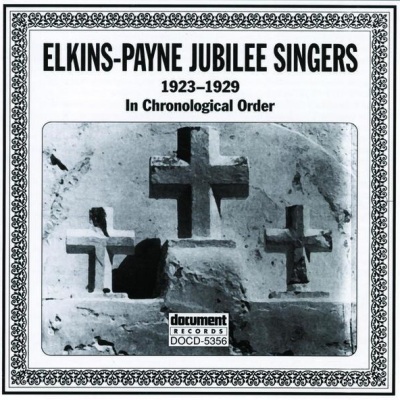
Complete Recorded Works In Chronological Order 1923-1929
Document's unprecedented salute to the Elkins-Payne Jubilee Singers brings together 24 recordings released by seven different labels during the years 1923-1929. The stylistic range on this one disc is remarkable, from vocal harmony groups and a cappella choirs through comedic sermons to a pair of gospel-flavored white dance band recordings that combine "light fantastic" Broadway entertainment esthetics with sanctified singing. The founder of this ensemble was one William C. Elkins, a talent scout who trolled for African-American artists at the Columbian Exposition of 1893, performed with Edith Pond's Midnight Stars, and worked for years as choirmaster for the touring vaudeville show fronted by George Walker and Bert Williams. Information leading to the identification of "Payne" has yet to be uncovered. It is likely that Elkins tapped the Paramount Jubilee Singers for participants on a set of recordings made for that label in November 1923 with an unaccompanied male vocal quartet. "Down by the Riverside" is not the familiar "study war no more" song, and a modified version of the melody is reused as "Standing in the Need of Prayer." The humorous "Elder Take It All" sketches ("See Me fo' You Go" and "On Dancing") feature the speaking voice of George Stamper backed by the quartet and organist Bob Rickets. In February 1924 the Elkins-Payne Jubilee Quartet recorded with Alberta Hunter, but unfortunately that collaboration is not represented here. For an OKeh recording date in November 1924 the Elkins-Payne group was expanded to include female singers identified as Miss Julia Mitchell and Miss Eloise Uggams. Elkins was one of the lead voices on "You Must Shun Old Satan," in which the Devil dons various articles of women's clothing. As is sometimes the case with rare recordings reissued by Document, track nine is flawed by damage to the surface of the original record, causing the needle to jump the groove more than once. The theory that Thomas "Fats" Waller played piano on track ten might have held water if any piano were audible; the source of the confusion lies in the fact that this selection was issued on Champion as the flip side of "Nobody Knows de Trouble I See" by Alta Browne and Bertha Powell. (To hear that and several examples of Waller backing Rev. J.C. Burnett, see the first volume of Waller's complete recorded works as reissued by JSP). Two Christmas carols recorded in December 1926 are described as rare occurrences in early 20th century African-American religious music; like much of Elkins' output these records were aimed at white audiences. Tracks 17-22 represent only half of the sides recorded by W.C. Elkins & His Dextra Singers for QRS in December 1928. The poetic delivery on "A Wheel in a Wheel" is particularly moving, and resonates strongly as a continuation of the Elkins group's two previous recordings of "Ezekiel Saw the Wheel." "Great Day" and "Without a Song" are two of the most unusual items in all of Document's gospel reissue catalog, for in November 1929 the William C. Elkins Jubilee Singers were used in an attempt to add some measure of authenticity to these topical tunes played by Roger Wolfe Kahn's dance band, a jazzed-up pop group that specialized in titles like "Crazy Rhythm" and "A Little Birdie Told Me So."
